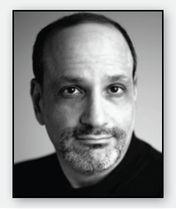Nolo's Essential Guide to Buying Your First Home (65 page)
Read Nolo's Essential Guide to Buying Your First Home Online
Authors: Ilona Bray,Alayna Schroeder,Marcia Stewart
Tags: #Law, #Business & Economics, #House buying, #Property, #Real Estate

BOOK: Nolo's Essential Guide to Buying Your First Home
8.61Mb size Format: txt, pdf, ePub
What’s Next?You’re almost there—proceed to the next chapter, on closing the sale!
CHAPTER 14

Seal the Deal: Finalizing Your Homebuying Dreams
Meet Your AdviserStephen Fishman,
a Bay Area attorney, tax expert, and author.
What he doesStephen has been writing about the law for over 20 years. Among his many books are
Home Business Tax Deductions; Deduct It! Lower Your Small Business Taxes
;
Every Landlordʹs Tax Deduction Guide;
and
Working for Yourself: Law & Taxes for Independent Contractors, Freelancers & Consultants
.First house“It was a one-bedroom condo in a 30-story building in Emeryville, California. I bought it because I was tired of being a renter and particularly tired of my landlord, who, among other things, failed to provide me with a stove for about a year! The condo complex was pleasant enough, with a pool, gym, and sauna. Unfortunately, it turned out to be quite noisy, and during the five years I lived there, I never actually used the amenities. But I earned a lot on the sale!”Fantasy house“A brownstone in Manhattan—maybe next to Central Park (on the West or East side, I’m not that picky). Those brownstones are bigger than they look. They give you all the advantages of a house, but with easy access to all that the city has to offer. Inside, I’d have an old-fashioned leather couch, wood paneling on walls, and Persian rugs on wood floors.”Likes best about his work“The intellectual challenge is great, but what I really like best is being able to work at home any time of the day or night!”Top tip for first-time homebuyers“Take your time looking—don’t buy the first thing that looks halfway decent, but wait to find something you really like. Enjoy the fact that, if you’re buying your first place, you’re probably under less pressure than someone who has to worry about selling an existing house at the same time.”
A
t last, you’re approaching closing day, when the house officially becomes yours. You should have the easiest job of anyone involved—mostly familiarizing yourself with documents that other people prepare and signing your name. That doesn’t mean sitting back and putting your feet up, though. You’ll need to stay in close contact with your team as they take care of the myriad tasks in the last hours before the closing. And be aware that some little surprise or bump in the road may come along on closing day. Fortunately, most house closings work out fine in the end, usually because the professionals involved have the experience to save the day.
t last, you’re approaching closing day, when the house officially becomes yours. You should have the easiest job of anyone involved—mostly familiarizing yourself with documents that other people prepare and signing your name. That doesn’t mean sitting back and putting your feet up, though. You’ll need to stay in close contact with your team as they take care of the myriad tasks in the last hours before the closing. And be aware that some little surprise or bump in the road may come along on closing day. Fortunately, most house closings work out fine in the end, usually because the professionals involved have the experience to save the day.
This chapter will tell you what to expect during the last hours leading up to the closing, and on the closing day itself, including:
• what a closing is—the who, what, and where of it
• how to conduct a thorough final walk-through
• tasks that you’re personally responsible for in the last days and hours before the closing
• what to expect when attending your closing, including what documents you’ll have to sign, and
• when you can move in.
TIPThe world won’t end if your closing gets delayed.
According to Carol Neil: “In my 30 years as a Realtor®, I never had an escrow where something new didn’t come up at the last minute, leading to scrambles or even a delayed closing date. I worked on one sale where the lender, at the 11th hour, asked for the buyer’s divorce papers—even though he’d already been divorced for about 15 years! Homebuying is like childbirth: You think you might not survive the process while it’s happening but later forget the pain and love the results.”
A closing (also sometimes called a “settlement”) is a meeting or a nearly simultaneous series of events during which you pay the seller and the seller transfers ownership rights to you. All of this will be orchestrated by your closing agent or, in some states, your respective attorneys.
The closing can’t happen until both you and the seller have either met or renegotiated all the terms of your purchase agreement. The two of you have, no doubt, been working hard to bring this about for weeks, by having inspections and repairs done, arranging for financing, and removing other contingencies. But during that time, you were still hanging onto your purchase money, and the seller still owned the house. The closing was created so that each of you could feel safe handing over what you own to the other.
Of course, if you’re not paying in cash, your lender actually holds much of the money for this transaction. The lender will be doing some last-minute investigating behind the scenes—don’t be surprised if your employer gets a call on closing day to make sure you still work there! When the lender decides that all is clear, you’ll be able (as part of the closing “ceremony”) to sign off on your loan and transfer your down payment to the seller. Your lender will then pay the seller the bulk of the purchase price (like you, using the closing agent as intermediary).
But enough generalities: What about
your
closing? The biggest logistical questions in the days leading up to it are:
your
closing? The biggest logistical questions in the days leading up to it are:
• When will it be?
• Where will it be?
• Who will attend?
When.
The exact date of your closing, or an approximate date, should have been specified in your purchase agreement. If the date wasn’t made absolutely clear, your closing agent will help you and the seller decide when you’ll all be ready.
The exact date of your closing, or an approximate date, should have been specified in your purchase agreement. If the date wasn’t made absolutely clear, your closing agent will help you and the seller decide when you’ll all be ready.

Don’t schedule your closing on a weekend.
Marge and her husband Theo lived a long way from their escrow agent’s office, so, as Marge explains, “We thought we were lucky when the escrow officer volunteered to come in on a Saturday. But then she got really annoyed when we wanted to read everything (our agent hadn’t given us drafts) and when a complication arose with our loan. Our mortgage broker wasn’t available by phone, and it took three hours to sort everything out. By the end, we were all exhausted. Theo and I had to force ourselves to go out and celebrate afterwards, but I’m glad we did.”
Marge and her husband Theo lived a long way from their escrow agent’s office, so, as Marge explains, “We thought we were lucky when the escrow officer volunteered to come in on a Saturday. But then she got really annoyed when we wanted to read everything (our agent hadn’t given us drafts) and when a complication arose with our loan. Our mortgage broker wasn’t available by phone, and it took three hours to sort everything out. By the end, we were all exhausted. Theo and I had to force ourselves to go out and celebrate afterwards, but I’m glad we did.”
Where.
The meeting will most likely take place at the office of either your escrow officer or attorney, the registry of deeds, your builder’s sales office, or (in rare cases) your lender. The choice of location depends on local custom.
The meeting will most likely take place at the office of either your escrow officer or attorney, the registry of deeds, your builder’s sales office, or (in rare cases) your lender. The choice of location depends on local custom.
Who.
Of course you’ll be there, preferably well-rested and fresh, along with any cobuyers. Don’t bring children! A closing is a serious, sometimes intense experience demanding your full attention. Hire a babysitter (for double the time you think it will take), and give yourself plenty of time for the meeting (and maybe an adult-only celebratory meal afterwards).
Of course you’ll be there, preferably well-rested and fresh, along with any cobuyers. Don’t bring children! A closing is a serious, sometimes intense experience demanding your full attention. Hire a babysitter (for double the time you think it will take), and give yourself plenty of time for the meeting (and maybe an adult-only celebratory meal afterwards).
TIPWhat if an emergency comes up and you or a cobuyer can’t be at the closing?
One possibility is to arrange to sign everything a few days beforehand, for example, if you’ll be traveling. Another is to prepare a document called a “power of attorney” giving signing power to a trusted friend, relative, or lawyer. The power of attorney should include an expiration date—perhaps a few days after the closing. Check with your attorney or closing agent for details of how the power of attorney needs to be formatted and possibly recorded with a government office.Your real estate agent should definitely be at the closing, offering support and carrying a packet of documents in case anyone forgot anything. You might also be accompanied by your mortgage broker and your attorney, if you have one. If you haven’t used an attorney up to now, but are worried about any last-minute issues or complications—for example, if a recently completed survey reveals that the house’s garage is over the neighbor’s property line—you can hire one before the closing.
Other books
Riddled on the Sands (The Lakeland Murders) by Salkeld, J J
Unleashed by Shadows (By Moonlight Book 10) by Nancy Gideon
Puzzle of the Pepper Tree by Stuart Palmer
Draykon by Charlotte E. English
Sexual Shift by Beverly Rae
JF02 - Brother Grimm by Craig Russell
The Gestapo and German Society: Enforcing Racial Policy 1933-1945 by Robert Gellately
Uriel's Descent (Ubiquity #1) by Allyson Lindt
Omega Days (Book 2): Ship of the Dead by Campbell, John L.
Orientation by Daniel Orozco



